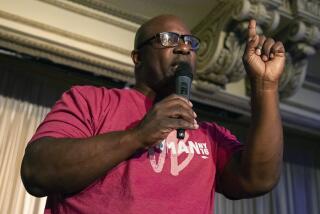New York conservatives see a victory
- Share via
WASHINGTON — For the moment, at least, the conservative insurgency in upstate New York can claim a victory.
The moderate Republican candidate in a special congressional election, Dede Scozzafava, dropped out of the race Saturday, increasing the chances that third-party candidate Doug Hoffman, the conservative favorite, will prevail in Tuesday’s vote.
Scozzafava cited a lack of funds in her surprise withdrawal three days before the election. It was a blow to the Republican Party establishment in Washington, which had dutifully lined up behind her even as Hoffman drew escalating support from the party rank and file.
In recent weeks, Hoffman won the backing of prominent conservatives, including former Alaska Gov. Sarah Palin and commentators Glenn Beck and Rush Limbaugh. Volunteers and money flowed into Hoffman’s campaign from across the country. National observers began to view the race for New York’s 23rd Congressional District as a struggle for the GOP’s soul.
Saturday, that struggle ended -- albeit temporarily.
“We won!” conservative writer Erick Erickson proclaimed on the popular RedState blog after Scozzafava’s exit.
Almost immediately, Michael Steele, chairman of the Republican National Committee, announced that the party would back Hoffman in Tuesday’s contest against Democrat Bill Owens. Key conservatives in the House said the same. The party had spent almost $1 million in backing Scozzafava.
But Erickson greeted the GOP’s last-minute embrace of Hoffman with scorn. “The movement has beaten them,” he said. “The establishment has to come to us. We’re not going to them.”
The local chairman of New York’s Conservative Party, which backed Hoffman from the start, was more conciliatory.
“I thought it was very good for her to make that decision for the good of the Republican Party,” Leonard Schick of Oswego County said of Scozzafava. “I was hoping it would have happened sooner. Three or four days ago, it was quite obvious she wasn’t going to win, and she was only taking votes away from Doug.”
The clincher for Scozzafava may well have been a new poll released by Siena College that showed her with just 20% of the vote while Hoffman and Owens were nearly tied at around 35% each. If the lion’s share of her support moves to Hoffman, he could win easily.
But Scozzafava, a member of the state Assembly who riled conservatives with her support of gay marriage and abortion rights, didn’t endorse anyone.
“I hereby release those individuals who have endorsed and supported my campaign to transfer their support as they see fit to do so,” she said in a statement Saturday.
Hoffman and Owens are running to replace former Rep. John McHugh, now secretary of the Army.
Democrats suggested that Scozzafava’s withdrawal signaled that the GOP was shifting away from the center.
“The extreme right wing sent a chilling message to the few remaining moderate Republicans: They are not welcome in the Republican Party, and differing opinions will not be tolerated,” said Jennifer Crider, a spokeswoman for the Democratic Congressional Campaign Committee.
But John Feehery, a Republican strategist in Washington, said that Hoffman may well have won the election even if Scozzafava had stayed in.
“That means that even in the Northeast, the country has become much more conservative than it was only 10 months ago,” Feehery said, suggesting that the Obama administration’s spending policies were responsible.
RedState’s Erickson said he expected Hoffman’s success to embolden other conservative candidates to mount challenges against GOP moderates across the country in next year’s congressional elections.
“The problem is, Republicans in Washington have now created a situation where conservatives feel ignored and feel inspired to challenge from the outside,” he said.
But Republican pollster Whit Ayers cautioned not to read too much into Hoffman’s surge. Ayers said Scozzafava’s liberal social views placed her well outside the mainstream of the party, so the situation isn’t likely to be replicated elsewhere. “You can make far too much out of one isolated case,” Ayers said.
Hoffman, Ayers added, still has to beat Owens on Tuesday for the conservative movement to show progress. If Hoffman loses, he said, “it’s not victory at all. It means you split the Republican Party.”
--
More to Read
Sign up for Essential California
The most important California stories and recommendations in your inbox every morning.
You may occasionally receive promotional content from the Los Angeles Times.










